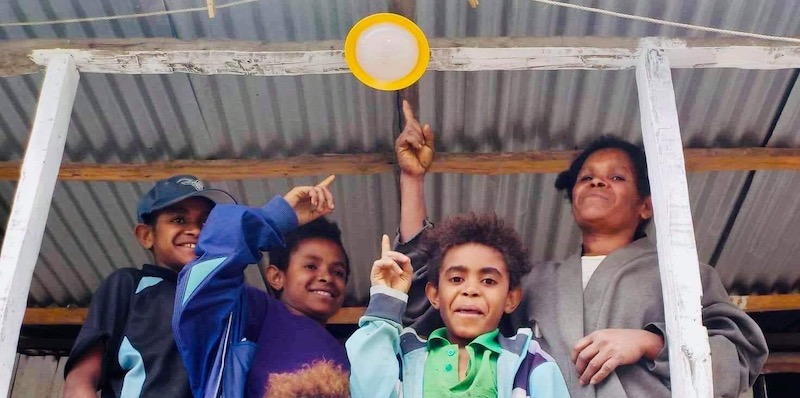Kokoda Track Foundation
Kokoda Track Foundation (KTF) has been recognised for Outstanding Achievement in The Australian Charity Awards 2020. The Australian Charity Award for Outstanding Achievement [OAA] recognises charitable organisations that have achieved outstanding results through initiatives that have significantly benefited charitable causes.
“KTF is delighted to have been recognised for Outstanding Achievement by The Australian Charity Awards in 2020 for Village Connect, a truly life-changing project. Working alongside local communities, KTF illuminated the historic Kokoda Track catchment area in Papua New Guinea, installing solar lighting and energy systems to over 1000 households in 30 villages. Solar energy brings so much opportunity in remote areas – the chance to study, do household work and business activities after the sun goes down and the ability to charge mobile phones for communication. It also improves safety after dark and reduces reliance on toxic and expensive kerosene. What a difference for every member of the family!
“We thank you for acknowledging the team’s efforts on this amazing project, which was made possible by our generous donors, DFAT’s Kokoda Initiative, Mundango Abroad, the George & Josie Palmer Fund and Back Track Adventures.”
Kokoda Track Foundation (KTF) is an international aid organisation working in Papua New Guinea (PNG) since 2003. Because of the shared history, the legacy of World War II, and the support Australia received during the Kokoda campaign, KTF supports communities in PNG overcome some of the tremendous challenges they face today. From a lack of adequate health care, to the half a million children who are unable to attend school because of the lack of teachers, resources, infrastructure and government capacity, KTF aims to make a tangible impact in the lives of the most vulnerable. With a vision of working with people and communities to improve the lives and futures of Papua New Guineans, KTF runs programs in the vital areas of education, health, and livelihoods across 16 of PNG’s 22 Provinces. These programs aim to train high quality teachers and community health workers, provide these professionals with mentoring and professional development opportunities, build educational and health infrastructure, fund the ongoing maintenance and resourcing of schools and aid posts, and provide remuneration to teachers and health workers across rural regions. KTF’s livelihoods program aims to generate sustainable income-generating opportunities for women in remote areas via investment in state-of-the-art solar technology, agriculture and women’s sanitary and health products. KTF has also delivered a national leadership program for the past 10 years with final year tertiary students from across PNG, finding and fostering the next generation of leaders. With a core focus on partnerships for delivery, KTF has forged strong relationships with key stakeholders, including community members, leaders, church groups, other NGOs, the trekking industry and government at local/district/provincial and national levels. This collaborative approach has established a solid platform for program design, implementation and delivery with a long-term view of sustainability. Programs are not operated in isolation, employing a holistic approach that integrates delivery, ensuring efficient utilisation of scarce resources for maximum impact, and adopts a whole-of-community approach to development interventions.
KTF’s Village Connect project provides household solar lighting and energy systems to rural and remote communities throughout PNG. With improved power and energy solutions, comes opportunities for villagers to engage in businesses and access communications, technology and other opportunities that improve the livelihoods of PNG people. KTF’s goal is to provide sustainable support in these important areas through carefully planned programs and projects designed to promote continuing self-improvement and the empowerment of vulnerable and marginalised communities.
Since 2012, KTF has been operating a number of health and education projects in the greater Kokoda region and had seen the patently obvious need for access to clean, affordable energy and lighting in an area. To translate this strategic need into a project implementation plan, KTF undertook extensive consultation with key stakeholders –communities, community leaders, local and Provincial government – to determine the project plan and timeline. KTF also worked closely with a number of co-delivery partners including the Kokoda Initiative (Department of Foreign Affairs and Trade) and No Roads to Health (NGO) to determine which areas should be focus areas for the project in order to enhance the collective development aims across the region.
KTF’s recent report EDUCATION, HEALTH AND WELLBEING: Experiences of people and communities along and around the Kokoda Track explored the qualitative narratives from teachers, health workers, and community leaders and members around the life-changing impact of the solar intervention. It was found that there have been improvements in a range of education, health, infrastructure and livelihoods outcomes for the communities along and around the Track over the past 5 years. Overall, the intervention that had the biggest impact for the communities along and around the Track over the past 5 years was the Village Connect project, with its positive impacts on kerosene usage, study time, livelihoods, wellbeing and sense of security. With the impacts on education, health, financial position, security and general wellbeing, the Village Connect project makes a vital contribution towards development at an individual and community level, helping communities to improve their overall quality of life and living standards, KTF’s core mission.
For further information on Kokoda Track Foundation visit ktf.ngo


